Ellen McLaughlin leads a stunning, emotionally grounded production of Shakespeare’s final play in Boulder.
Shakespeare opens The Tempest mid-chaos, but the Colorado Shakespeare Festival’s production makes a different choice. Before the storm, sailors relax on the deck of a ship, laughing and at ease, until Ariel and Prospera visibly orchestrate the storm that will upend it all.
It’s a subtle but significant directorial choice. Of course, Prospero has always summoned the tempest that starts the play, but by placing its creation onstage and letting the audience see its architects in action, director Kevin Rich reframes the chaos as intentional.
This Tempest doesn’t begin in disaster — it begins with a decision.
That attention to emotional clarity and storytelling intention defines the entire production, which runs through August 10 in the Roe Green Theatre on the campus of the Univerisity of Colorado – Boulder. Launching CSF’s 68th season, Rich’s staging blends bold visual storytelling with grounded performances to deliver one of the most cohesive, thematically rich versions of the play in recent memory.
With Ellen McLaughlin leading the cast as a commanding Prospera (yes, gender-flipped from the traditional Prospero), the show leans into the tension between rulers and servants, grounding Shakespeare’s fantastical narrative in a powerful emotional and surprisingly political core.
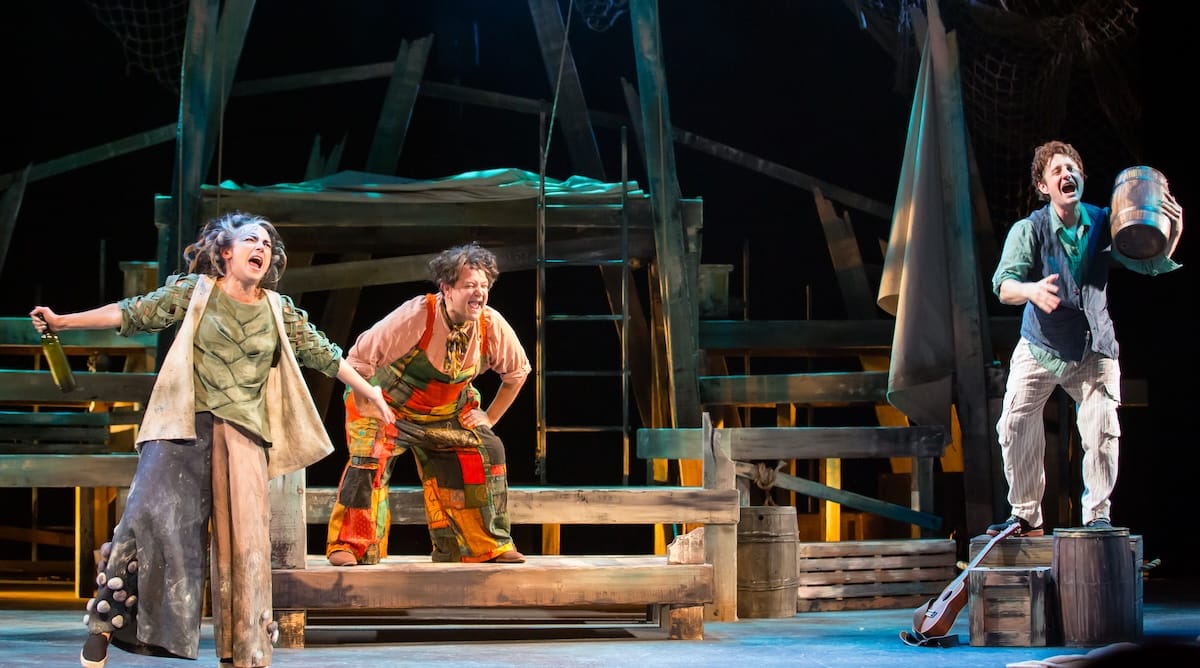
(From left) Karen Slack as Caliban, Matt Zambrano as Trinculo and Sean Scrutchins as Stefano.
A lush, anti-colonial dreamscape
The Tempest centers on Prospera, the exiled Duchess of Milan, who has lived for years on a remote island with her daughter Miranda. When her former enemies are shipwrecked there, Prospera uses her powers and her spirit servant Ariel to toy with them and enact long-awaited revenge. But as her daughter falls in love with the usurper’s son, and her control over the island begins to fray, Prospera must choose between domination and release.
This production’s setting walks a fascinating line between the contemporary and the mythical. Costume designer Sarah Zinn wisely resists pinning the setting to any single era, allowing for a dreamlike, fairytale ambiance that heightens the show’s thematic tension.
The shipwrecked nobles wear modern-ish suits, suggesting sleek Western colonial powers intruding on a place they do not understand. In contrast, the island’s spirits are dressed in vibrant, tie-dyed costumes that defy clear temporal placement.

Jordan Coughtry as Ariel and Jordan Pettis as Ferdinand. | Photo: Jennifer Koskinen
A complex figure
McLaughlin, who starred in CSF’s King Lear in 2023, brings gravity and nuance to Prospera. She begins the play as a stern and imperious figure, a mother and ruler who keeps her island and daughter on a tight leash.
However, as the story unfolds, McLaughlin softens her grip. You can see the transformation in her body, voice and eyes: as Miranda falls in love, as Ariel longs for freedom, as Caliban rages against his captivity, Prospera begins to see the price of her power.
In a breathtaking late scene, she surrenders her magical books and staff, not into the sea, as is traditionally done, but to Caliban, the island’s original inhabitant. It’s a poignant re-centering of Shakespeare’s closing gesture that shifts the focus from personal renunciation to restorative justice.
Karen Slack’s Caliban is a revelation. Far from a grotesque caricature, her performance is full of pain and strength. Slack plays Caliban not as a monster but as a colonized subject, chained in every sense by Prospera’s rule. Her rightful fury burns through every scene. It’s among the most human, heartbreaking portrayals of the character I’ve seen.
Jordan Coughtry’s Ariel is the production’s other standout. A constant musical presence, Coughtry scores the play live with mandolin and other instruments, weaving Shakespeare’s lyrics into new compositions that echo through the theater like wind through trees.
Ariel’s music is the magic here, and Coughtry uses it to beguile, to haunt and eventually to plead for his own freedom. His performance really makes you care about the character, which makes his final parting with Prospera all the more affecting.
Vibrant, humanistic direction
Rich’s direction shines in both large and small moments, balancing spectacle with intimacy. He and shadow puppet designer Myra Su use beautiful silhouette sequences to depict Prospera’s backstory, the spirits of the island and key magical interventions. These moments — illuminated behind suspended white sheets that once formed the ship’s sails — are visually striking and help visually communicate some of the show’s trickier exposition.
Scenic designer Matthew S. Crane’s flexible, multi-level set evokes the wreckage of a ship scattered across an island, and it shifts fluidly to accommodate dances, duels and domestic scenes alike. Lighting designer Katie Gruenhagen complements this world with a dynamic palette that captures everything from lightning storms to moonlit enchantments, often enhanced using string lights and lanterns for added texture.
The comic subplot, too often a tonal hiccup in Tempest productions, is handled deftly here. Matt Zambrano (Trinculo) and Sean Scrutchins (Stephano) make for a wonderfully odd couple; their antics grounded in character rather than schtick. Their Act I scene with Caliban, which involves a rug and slapstick tangle, is genuinely hilarious and one of the best depictions of the scene I’ve seen.
Madison Taylor and Jordan Pettis make a charming and surprisingly modern Miranda and Ferdinand. Their chemistry is built not just on romance but mutual respect, especially in their log-carrying scene, where Miranda’s strength is visible, and Ferdinand admires her all the more for it.
The entire ensemble deserves credit for creating such a cohesive and compelling theatrical world. Every performer, from shipwrecked noble to shimmering spirit, contributes to a production that’s visually rich, thematically resonant and remarkably easy to follow. It’s a crowd-pleasing Tempest that never loses sight of the play’s questions about power, control and forgiveness.
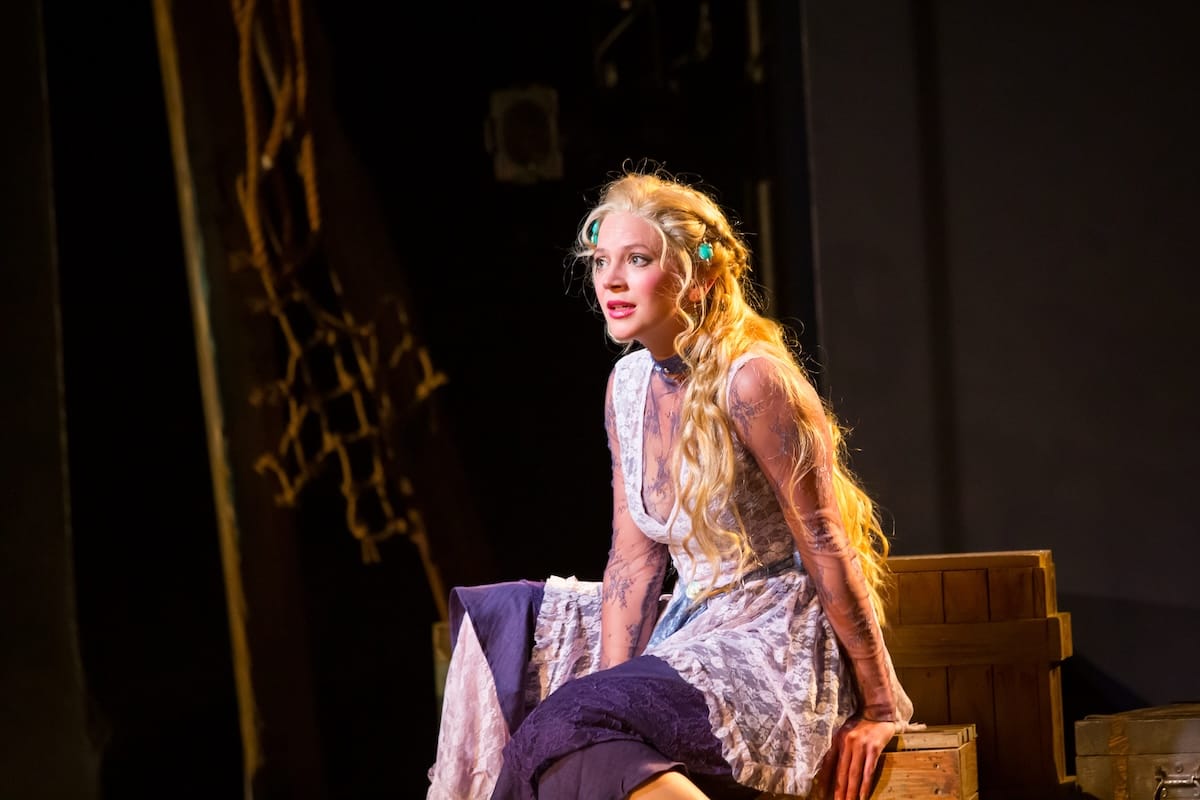
Madison Taylor as Miranda. | Photo: Jennifer Koskinen
Shakespeare at its best
Pacing-wise, the show is taut without feeling rushed: the first act clocks in at just over 55 minutes, and the second runs about an hour and 25 minutes. Rich avoids the temptation to let things drag in the name of poetry or overindulge in the show’s comic moments.
What’s most impressive about this Tempest is how it manages to be both visually arresting and emotionally grounded. The world is surreal, but the characters remain authentic. They are not symbols or clowns, but people caught in a moment of extraordinary transition.
In the end, Prospera’s island is not just a place of storms and spells — it’s a crucible for transformation. And in Rich’s hands, it becomes a space where old wrongs are acknowledged, wounds start to heal and the future, however uncertain, feels newly possible.
A Colorado-based arts reporter originally from Mineola, Texas, who writes about the changing world of theater and culture, with a focus on the financial realities of art production, emerging forms and arts leadership. He’s the Managing Editor of Bucket List Community Cafe, a contributor to Denver Westword and Estes Valley Voice, resident storyteller for the Bonfils-Stanton Foundation and co-host of the OnStage Colorado Podcast. He holds an MBA and an MA in Theatre & Performance Studies from CU Boulder, and his reporting and reviews combine business and artistic expertise.
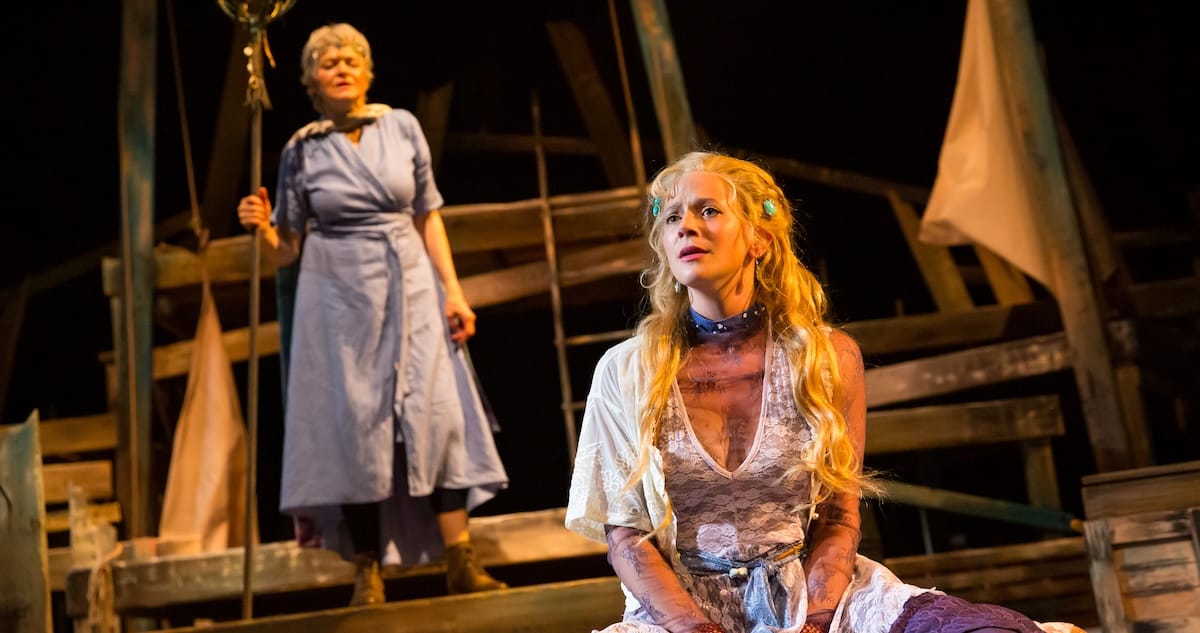
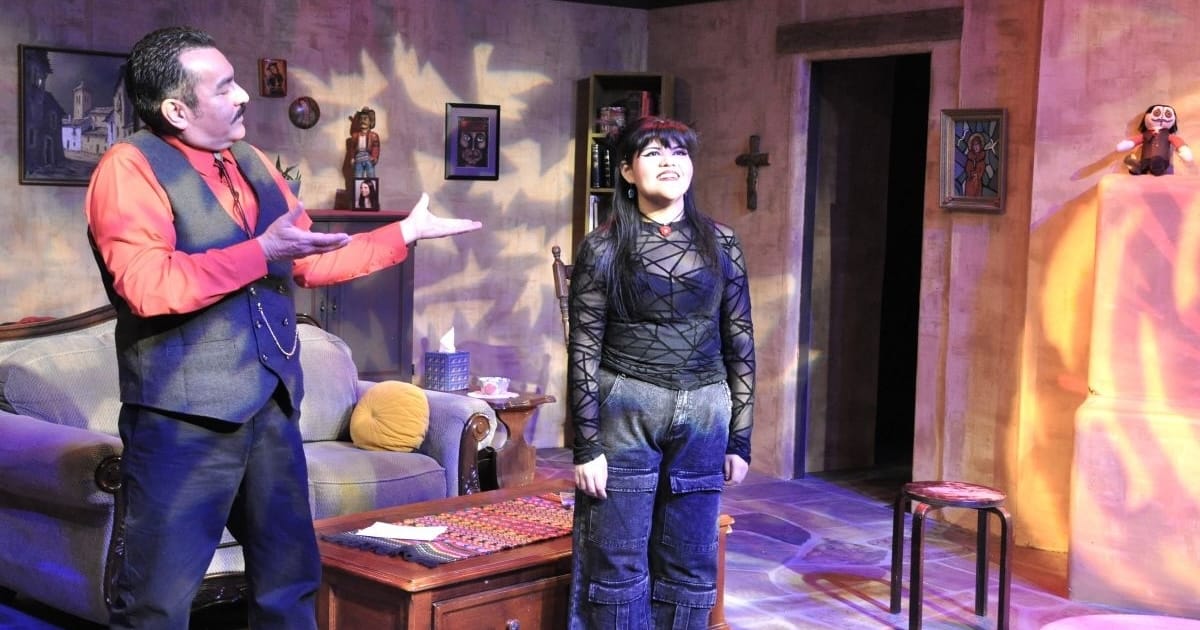
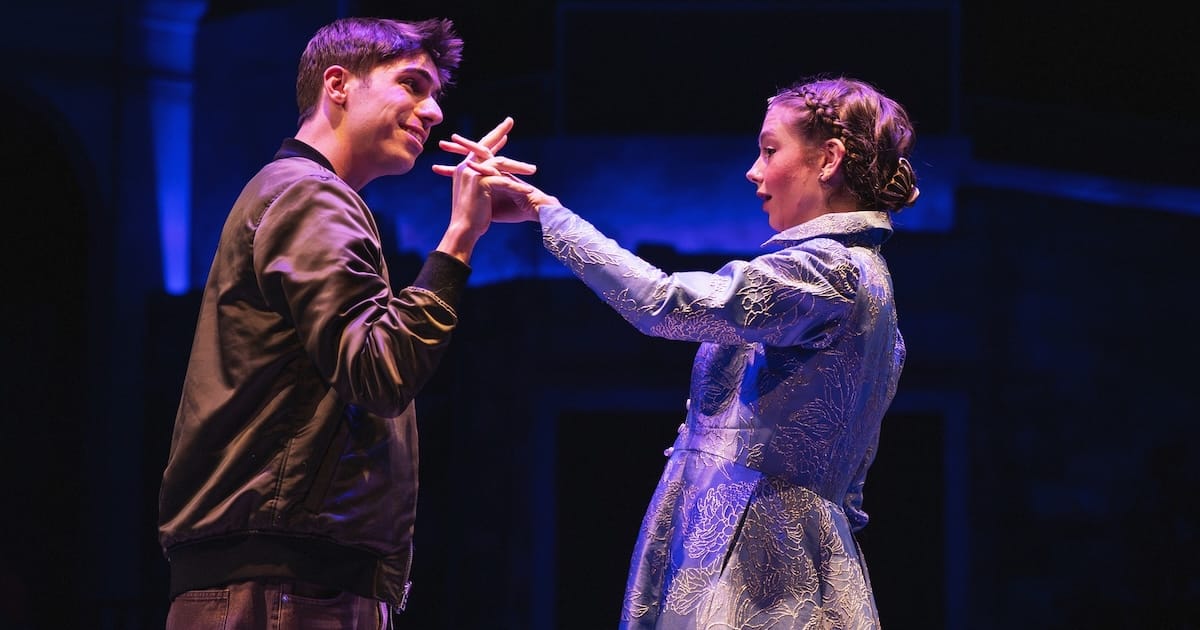


Leave A Comment